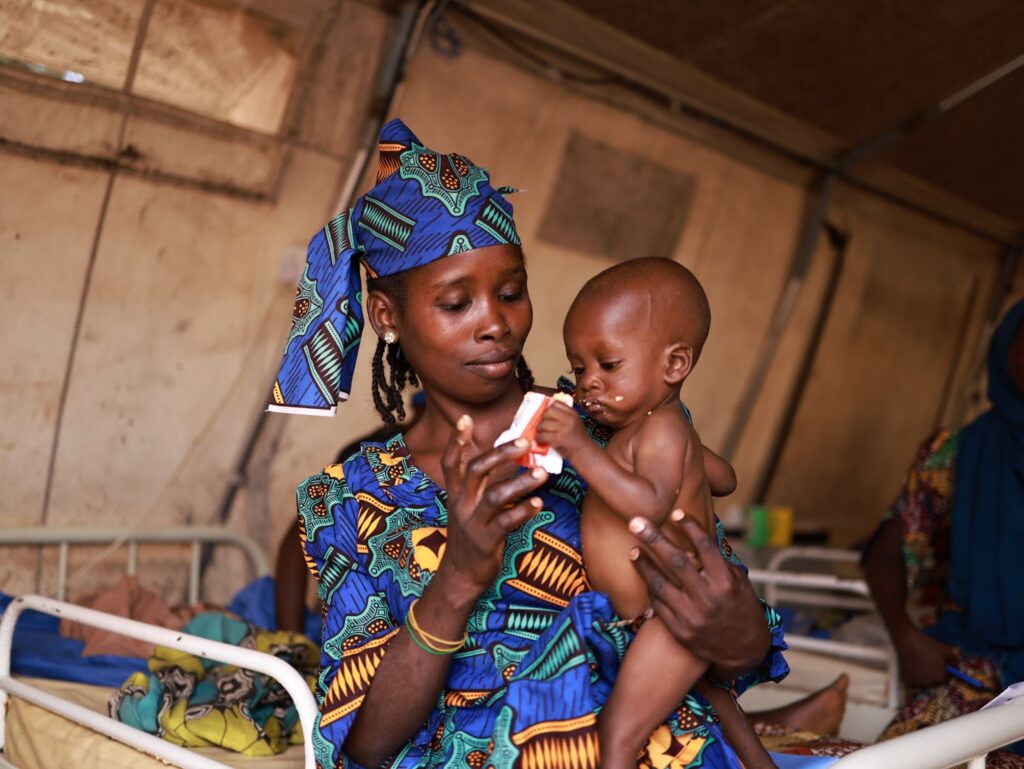The malnutrition crisis ravaging children in northwestern Nigeria has reached “extremely critical” levels, with over 30 per cent of under-five in Kastina, Jibia, and Mashi local government areas (LGAs) suffering from acute malnutrition, according to a recent survey by Médecins Sans Frontières (MSF).
The study, released in collaboration with Epicentre, MSF’s epidemiology arm and the Katsina State Ministry of Health, carried out in July 2024, shows a sharp rise from 22 per cent in 2022. Severe acute malnutrition (SAM), the deadliest form, now affects between 6.8 to 14.4 per cent of children, reflecting a doubling of malnutrition rates compared to 2023, when the situation was already dire.
“These results are, quite frankly, terrifying,” said Dr Raphael Kananga, MSF Medical Coordinator, in a report on Thursday, Dec. 5. “We have seen figures rising steadily for the past couple of years, and now we are moving from critical to extremely critical levels. We really need to see more, not less, action from organisations; otherwise, we are going to see children dying in record numbers.”
The rise in malnutrition reflects a broader pattern of deepening humanitarian crises across Nigeria’s north. In June, MSF revealed severe overcrowding at its facilities, with some children being treated on mattresses laid on the floor. “Our facilities are full. Children are dying,” the organisation said at the time, calling for urgent global support.
Earlier in April, in Maiduguri, North-east Nigeria, the medical humanitarian organisation admitted 1,250 severely malnourished children with complications—a figure double that of April 2023. This forced MSF to expand its inpatient care capacity from 200 to 350 beds.

Similarly, in Bauchi State, admissions for severely malnourished children between January and March 2024 rose by a staggering 188 per cent compared to the same period last year. Across northwestern states, inpatient and therapeutic feeding centres reported a 20 to 100 per cent rise in cases between March and April this year.
Systemic issues fuel hunger
The rising hunger crisis is deeply intertwined with broader systemic challenges, including soaring inflation, a weakened naira, and declining agricultural yields. Compounding these challenges are persistent insecurity and climate shocks, such as floods, which have devastated livelihoods and disrupted supply chains.
In October, the International Committee of the Red Cross (ICRC) reported worsening food insecurity in northeast Nigeria, where child malnutrition has risen to 24 per cent. A month earlier, the Norwegian Refugee Council (NRC) highlighted how severe flooding in Maiduguri had exacerbated the humanitarian crisis in Borno State. The organisation called for immediate intervention, warning of dire consequences if urgent support was not provided.
Dr Simba Tirima, MSF’s Country Representative, echoed these concerns, emphasising the cascading effects of climate change, conflict, and economic hardship. “We have utilised every available resource, from overflow tents to spare mattresses, to manage the influx of patients arriving at our hospitals. Without meaningful and immediate action, I fear the situation could worsen dramatically in the coming year,” Dr Tirima noted.
Funding shortfalls and global food shortage
Despite the alarming rise in malnutrition cases, aid organisations are constrained by funding cuts and the global shortage of therapeutic food. Between January and September 2024, MSF treated over 100,000 malnourished children in Katsina State, a 20 per cent increase compared to the same period in 2023. Admissions requiring hospitalisation in the northwestern state rose by over 50 per cent. Yet, more than 800 children succumbed to malnutrition-related complications in MSF’s facilities between January and September.
The crisis extends beyond Katsina. Across seven states in northern Nigeria where MSF operates, 294,000 children were treated for malnutrition between January and September 2024—a 43 per cent increase from the previous year. In Zamfara State, the lack of therapeutic food has forced caregivers to ration treatments since March.
UNICEF has issued an international appeal, warning that nearly two million children across 12 countries face imminent death due to similar shortages.
A call for immediate action
The findings from Katsina State underscore the urgent need for intervention. MSF has called on the Nigerian government and international community to prioritise funding for malnutrition interventions and to include northwestern Nigeria in the United Nations’ humanitarian response plan. Despite the region’s growing crisis, this critical step has yet to be taken.
“We recognise the Federal Ministry of Health and Social Welfare’s recent and ongoing efforts to tackle malnutrition,” Dr. Tirima said. “If all stakeholders increase funding and ensure a reliable supply of therapeutic food, there is hope that we can save the lives of many children next year.”
As Nigeria confronts this crisis, the Northwest region risks sliding further into catastrophe, with dire consequences for millions of vulnerable children and families, if significant interventions are not undertaken.
Humanitarian organisations like MSF continue to sound the alarm, but their efforts alone cannot resolve the crisis. A coordinated global response—encompassing increased funding, resource allocation, and systemic reforms—is essential to prevent a devastating loss of life and to lay the foundation for long-term resilience in the region.
The malnutrition crisis among children in northwestern Nigeria has reached “extremely critical” levels, with a recent survey by Médecins Sans Frontières showing over 30% of children under five in some areas suffering from acute malnutrition. This reflects a doubling of malnutrition rates compared to the previous year, exacerbated by rising healthcare demand and systemic challenges like inflation, climate shocks, and insecurity.
Funding shortfalls and a global food shortage have further strained aid efforts, with MSF reporting significant increases in malnutrition cases across northern Nigeria.
MSF and other organizations have called for urgent global support to prevent further loss of life, stressing the need for coordinated action, including increased funding and resource allocation.
Humanitarian groups continue to plead for intervention, warning of severe consequences if the crisis is not addressed promptly.
Without meaningful action, the situation may worsen, endangering millions of vulnerable children and families in the region.
